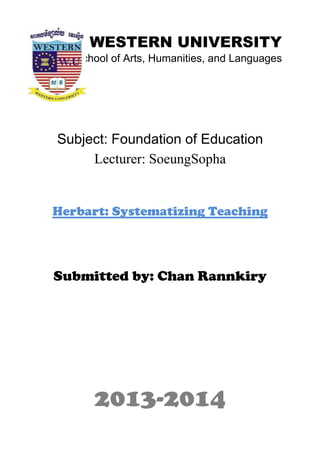W chan rannkiry
•Transferir como DOCX, PDF•
0 gostou•247 visualizações
Denunciar
Compartilhar
Denunciar
Compartilhar

Recomendados
Recomendados
Mais conteúdo relacionado
Mais procurados
Mais procurados (20)
100. philosophy-of-education-dimensions-of-personality-by-nel-noddings-1

100. philosophy-of-education-dimensions-of-personality-by-nel-noddings-1
Crux of Structuralism School of thought in psychology

Crux of Structuralism School of thought in psychology
Semelhante a W chan rannkiry
Semelhante a W chan rannkiry (20)
EDUC 1002 Pioneers and Philosophies of Education Week 3 .docx

EDUC 1002 Pioneers and Philosophies of Education Week 3 .docx
EDUCATIONAL PHILOSOPHIES OF FRONTIER THINKERS.pptx

EDUCATIONAL PHILOSOPHIES OF FRONTIER THINKERS.pptx
Mais de Channy Leang
Mais de Channy Leang (20)
Asean a community of opportunities (overview ppt) jan2015

Asean a community of opportunities (overview ppt) jan2015
គិតជាសកល ទទួលបានភាពរុងរឿងក្នុងតំបន់ សហគមន៏សេដ្ខកិច្ចអាស៊ានឆ្នាំ២០១៥

គិតជាសកល ទទួលបានភាពរុងរឿងក្នុងតំបន់ សហគមន៏សេដ្ខកិច្ចអាស៊ានឆ្នាំ២០១៥
12 writing systems (why does the coming together of two women in china result...

12 writing systems (why does the coming together of two women in china result...
W chan rannkiry
- 1. WESTERN UNIVERSITY School of Arts, Humanities, and Languages Subject: Foundation of Education Lecturer: SoeungSopha Herbart: Systematizing Teaching Submitted by: Chan Rannkiry 2013-2014
- 2. Background Johann Friedrich Herbart was born on May 4, 1776 and died on August 14, 1841 in Gottingen, Hanover. He is a German philosopher and educator, who led the renewed 19th -century interest in Realism and is considered among the founders of modern scientific. After study under Johann Gottlieb Fichte at Jena (1794), Herbart worked as a tutor at Interlaken, Switz from 1797 to 1800, during which period he made the acquaintance of Pestalozzi. Becoming a licentiate of the University of Gottingen in 1802, he was appointed extraordinary professor there in 1805. At the close of 1808 he became Kant’s successor as professor at Konigsberg. There he also conducted a seminary of pedagogy until 1833, when he returned as professor of philosophy to Gottingen, where he remained until his death. Herbart’s position in the history of philosophy is due mainly to his contributions to the philosophy ofmind. His aims in this respect are expressed by the title of his textbook“Psychology As KnowledgeNewly Founded on Experience, Metaphysics, and Mathematics” 2 vol. of central importance is the inclusion of Mathematic. He rejected the whole concept of faculties in Kantian terms and regarded mental lifeas the manifestation of elementary sensory units or “presentations”.These heconceived as mental forces rather than as mere “ideas” in Locke’s sense. The study of their interactionsgave rise to a statics and dynamics of the mind, to be expressed in mathematical formulas like those of Newtonian mechanics. Ideas need not be conscious and they might either combine to producecomposite resultants or conflict with one another so that some get temporarily inhibited or repressed“below the threshold of consciousness.” An organized but unconscious system of associated ideasformed an “apperception mass”; such a system could apperceive a new presentation and thus give itricher meaning. On this basis Herbart developed a theory of education as a branch of appliedpsychology.
- 3. Theory of Herbart His theory of education was known as Herbartianismwas set out principally in two works, “Pestalozzi’s Idea of an A B C of Sense Perception”and “Universal Pedagogy”, which advocated five formal steps in teaching, preparation, a process of relating new material to be learned to relevant past ideas or memories inorder to give the pupil a vital interest in the topic under consideration; presentation, presentingnew material by means of concrete objects or actual experience; association, thorough assimilationof the new idea through comparison with former ideas and consideration of their similarities anddifferences in order to implant the new idea in the mind; generalization, a procedure especiallyimportant to the instruction of adolescents and designed to develop the mind beyond the level ofperception and the concrete; and application, using acquired knowledge not in a purely utilitarianway, but so that every learned idea becomes a part of the functional mind and an aid to a clear, vitalinterpretation of life. This step is presumed possible only if the student immediately applies the newidea, making it his own. Herbart maintained that a science of education was possible, and he furthered the idea that educationshould be a subject for university study. His ideas took firm hold in Germany in the 1860s and spread also to the United States. By the turn of the century,however, the five steps had degenerated to a mechanical formalism, and the ideas behind them werereplaced by new pedagogical theories, in particular those of John Dewey.
